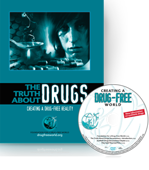COMMUNITY ACTIONS
SPREADING THE TRUTH ABOUT DRUGS
GLOBAL MESSAGE

WHEN INDIVIDUALS, ESPECIALLY YOUNG PEOPLE, learn the TRUTH ABOUT DRUGS, they NATURALLY want to BRING that INFORMATION to OTHERS.
Organized volunteer actions across some 180 countries have resulted in the distribution of 50 million drug prevention booklets and tens of thousands of community drug awareness activities.
The impact in preventing drug use is significant. Those who are informed can resist peer pressure and choose for themselves to never start drugs in the first place.
There is another result: When individuals, especially young people, learn the truth about drugs, they naturally want to bring that information to their friends and others. And thus the program and its activities continue to expand person to person, community to community.
The Truth About Drugs campaign is carried out through a wide variety of actions and events, each a proven means to popularize and promote drug-free living. To engage and empower as many people as possible, the activities are simple and designed for participants of all ages. Above all, they are effective in bringing the truth about drugs to millions.
Volunteers set up information booths in high-traffic city locations, bringing the facts to the attention of hundreds of thousands of pedestrians through booklet distribution, PSA showings, informal lectures, drug-free pledge signings, and performances by musicians, acrobats and other entertainers.



Local businesses support the campaign, providing the drug education booklets to customers and employees and displaying posters in their windows.
Essay and poster contests recognize effective expressions of messages to live drug-free. Such contests are organized in schools, youth activity clubs and community centers to raise awareness about drugs and increase involvement in activities that popularize drug-free living. The essays and posters, including the winning entries, are exhibited in schools, community centers and churches.
Drug-free youth clubs are yet another effective means of promoting a drug-free lifestyle. They are formed around one simple message: Find out the truth about drugs. Club members distribute the Truth About Drugs materials to their friends, classmates and neighbors, encouraging them to sign the drug-free pledge.
Volunteers conduct drug education lectures in schools at all grade levels, using the information in the Truth About Drugs booklets and public service announcements.
Young people appear on local public access television and radio talk shows to promote their drug education activities.
Drug-free concerts promote drug-free living through music, accompanied by banners, T-shirts and booklet distribution.
Drug-free marathons, bike tours and other sports events have become a tradition in many areas, with organizers inviting the support of athletic and entertainment figures and obtaining sponsorship from small businesses and large corporations. Activities around the world are as diverse as their locales:
■ City council members participate in drug-free pledge rallies in Kaohsiung, Taiwan.
■ Truth About Drugs volunteers in London, England, observe the United Nations Day Against Drug Abuse with booklet distribution, petition signing and educational lectures.
■ Switzerland celebrated the 20th anniversary of its drug education campaign with nationwide booklet distribution.
■ In France, the sustained 20-year campaign of Truth About Drugs, with millions of booklets distributed in cities across the country, has contributed to a measurable drop in marijuana consumption among youth after two decades of rising use.



















